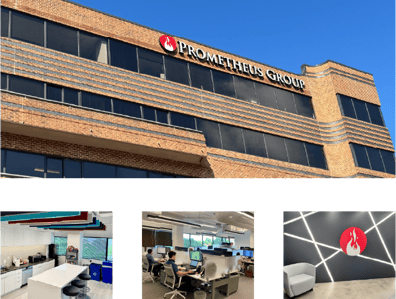Understanding the variety of acronyms in the tech world can be daunting, especially when you’re trying to get a grasp on the systems that keep your organization running smoothly. For those outside the software sales space, this challenge is even greater.
However, it’s crucial to understand what an Enterprise Resource Planning (ERP) system is—both to evaluate your current system’s capabilities and identify areas where additional tools or integrations, such as maintenance management solutions, may be required.
At Prometheus Group, we specialize in integrating with ERP systems to simplify maintenance management. Because ERP systems often address multiple facets of a business, maintenance functionality can sometimes be underdeveloped. In these cases, external tools like spreadsheets are used to fill the gaps.
This blog will give you a comprehensive understanding of ERP systems, helping you identify any gaps in your current processes—particularly in asset maintenance.
ERP System Meaning
The definition of an enterprise resource planning (ERP) system is a holistic system that allows you to manage all functions of your business in one spot. This is usually achieved through one database with multiple business modules.
The benefit of using a single ERP system to manage all aspects of your company is that when it comes time to track what you have sold, production, sales, and accounting are all tied into one. And those are just a few of the things that an ERP system does.
By having your business processes centrally located in one database, information is recorded, communicated, and managed with as little manual effort as possible. This dramatically streamlines your workflows so that folks spend less time manipulating data and more time on value-add activities that cannot be automated.
Brief History of Enterprise Resource Planning
ERP systems have evolved significantly since their inception in the 1960s. Initially designed to centralize data for large corporations, ERP systems have become accessible to businesses of all sizes thanks to technological advancements.
Over time, ERP solutions have expanded to include industry-specific functionalities, becoming indispensable tools for organizations seeking to improve efficiency, optimize workflows, and enhance decision-making. Today, leading providers such as SAP, Oracle, and Microsoft Dynamics offer scalable solutions tailored to diverse business needs.
What Does an ERP system Do?
We’ve alluded to it a bit, but you’re probably still wondering “what functions does an ERP system manage?”
ERP systems generally handle a multitude of tasks, such as:
- Sales management
- Accounting management
- Production management
- Enterprise asset management
- Supply chain management
- Procurement and purchasing
- Customer service management
- Human resources management
- Employee and contractor management
- Inventory management
- Reporting and analytics
These systems ensure smooth communication across departments, streamlining day-to-day tasks. However, as mentioned earlier, some ERP modules, like maintenance management, may require additional integrations for optimal performance.
The Business Value and Importance of ERP Systems
In today’s fast-paced business environment, ERP systems are essential for streamlining operations and enhancing efficiency. They provide a centralized platform for real-time data access, enabling informed decision-making, automation of routine tasks, and improved collaboration across departments.
ERP systems offer tailored solutions for various industries, with providers like SAP, Oracle, and NetSuite delivering robust platforms. By embracing ERP technology, businesses can improve productivity, reduce costs, and boost customer satisfaction, ultimately driving profitability.
Benefits of ERP Solutions
ERP systems integrate and automate various business processes, improving efficiency and reducing manual tasks. They enhance data accuracy and provide real-time insights, enabling better decision-making. Organizations benefit from increased productivity, cost savings, and improved overall performance, staying agile in today’s competitive landscape.
What Is an Example of an ERP System?
What is SAP ERP?
SAP ERP integrates modules like finance, human resources, logistics, and sales into a unified system. It enhances decision-making and streamlines operations with real-time data flow.
Benefits include:
- Improved efficiency
- Reduced cost
- Enhanced customer service
- Greater transparency across the organization.
What is Oracle ERP?
Oracle ERP is a comprehensive system that streamlines processes like finance, HR, and supply chain management. Known for its robust capabilities, it supports better productivity and profitability across industries.
Benefits include:
- Seamless integration
- Real-time insights
- Enhanced decision-making
- Helps businesses stay competitive and adapt to changing market demands
What is IBM Maximo ERP?
IBM Maximo ERP focuses on asset and resource management, offering features like supply chain management and workforce optimization. When integrated with Prometheus IBM technology, it provides advanced analytics and predictive maintenance capabilities.
Benefits include:
- Centralizes asset tracking, inventory management, and maintenance scheduling
- Drive better decisions, reduces errors, and improves efficiency for industries like manufacturing and healthcare
Additional ERP Systems
Beyond SAP, IBM Maximo, and Oracle, there are other ERP systems that asset intensive industries may use, like:
The enterprise resource planning system a company chooses to use will usually depend on their industry and their unique needs.
Are There Different Deployment Types of ERP Systems?
When it comes to selecting an ERP system, companies will usually have the option between the following types of ERP systems:
- On-premises
- Cloud
- Hybrid
- Two-tier
On-premises ERP
On-premise hosting involves the setup and maintenance of servers on location by an organization’s IT professionals.
Cloud ERP
Cloud ERP solutions are managed by a hosting provider, like Amazon Web Services or Microsoft Azure. These providers maintain servers in various data centers across the country in specialized facilities.
Cloud hosting provides a myriad of benefits such as guaranteed uptime, automated fail over and trailing backups. This ensures your critical systems are up and running at all times and your data is preserved in the event of local mishaps.
Hybrid ERP
Hybrid ERP systems contain elements of both on-premises and cloud solutions. This will generally include an on-premises ERP system for certain business functions (accounting, production, etc.), with cloud ERP solutions to support additional business units (like sales).
Two-tier ERP
The two-tier ERP model uses different systems for various parts of an organization, such as a cloud-based ERP for headquarters and specialized ERPs for subsidiaries. This approach enhances flexibility, customization, data integration, optimizing operations. Companies like Procter & Gamble and Hitachi successfully leverage two-tier ERP to boost efficiency and productivity.
Is an ERP System the Same as a CMMS?
ERP systems and a CMMS (Computerized Maintenance Management System) can provide similar capabilities but differ in their purpose. ERP systems are designed to help organizations manage a variety of enterprise functions as we listed above, including asset management.
A CMMS is focused on maintenance operations and is built to help organizations improve asset lifespan and reliability. Some organizations may use a CMMS instead of an ERP to manage their assets.
In other cases, a company may use a CMMS system (to manage maintenance) and an ERP system (to manage other business functions) and integrate them with one another. Other companies may use a core ERP system and establish integrations to make managing maintenance activities like maintenance planning and scheduling, permitting and safety, or capital projects easier.
How do ERP Systems work?
ERP systems integrate diverse business processes into a single platform, automating tasks such as inventory management and financial reporting. This centralization improves communication, reduces errors, and provides real-time insights, ultimately driving productivity and growth.
What Size Companies Need ERP Systems?
Any size business can use an ERP system. Although, many businesses will attempt to operate without utilizing an ERP system by using siloed systems. These can range from pen and paper to Microsoft Excel, to more advanced home-grown developments. These systems often lack integration to the rest of an organization’s software landscape.
If a business is able to get all of their products delivered to customers on time, always reach production goals, and have a handle on asset management operating without an ERP, they may be able to operate without one. However, it is very difficult for companies to scale and achieve perfect business performance without an ERP system.
Additionally, like any other system, having most of your business processes all in one place (in an ERP) will help you cut down on software costs of siloed systems and increase the efficiency and communications between different departments.
Select the Correct ERP System for Your Business
ERP systems are an invaluable tool to organizations. When you have the correct system and it is managed well, your business is able to run like a well-oiled machine.
However, if your ERP system is not helping you achieve all of your goals, you may need to consider integrations to extend or streamline the functionality of your ERP system.
The Prometheus Platform: Integrated Solutions for ERPs
The Prometheus Group platform seamlessly integrates with ERP systems to enhance maintenance and operational efficiency. By leveraging this integration, users can streamline processes, increase productivity, and optimize resource utilization. Through real-time data syncing, automated workflows, and centralized information access, organizations can effectively manage their assets, reduce downtime, and make data-driven decisions. This seamless integration provides a holistic view of maintenance operations, standardizes processes, and improves overall operational performance.
At Prometheus Group, we understand the vital role that ERP systems play in streamlining business operations and enhancing overall efficiency. Check out our ERP Resources to learn more about how Prometheus Group can help your business.
If you have questions about getting integrations to add enterprise asset management functionalities to your ERP system, reach out to us today. If you would like to learn more about our maintenance integrations, check out our Prometheus Platform.
Prometheus Group ERP Resources
- Prometheus Group Solutions for SAP ERP
- Prometheus Group Solutions for Oracle ERP
- Prometheus Group Solutions for IBM Maximo ERP
- Blog Post: Why Implement an ERP Connected Mobile Solution?
- Blog Post: Break up with Worker Fatigue, Not Your ERP, EAM, or CMMS
- Blog Post: How to Merge Two ERP Systems After a Business Acquisition
- Blog Post: Do You Use the Best Software Integration Solution for Your ERP/CMMS?
- ERP Training Courses
- The Prometheus Platform



